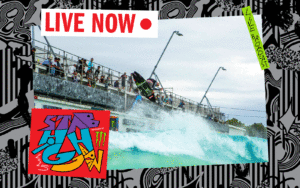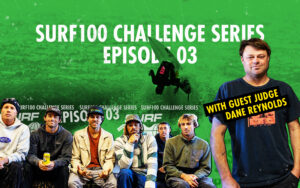How A Legacy Surf Brand Kept All Their Employees Working And Demonstrated The Strength Of The American Factory
Birdwell’s CEO Geoff Clawson on direct-to-customer relationships and how they kept furloughs at bay sewing masks for frontline workers.
As the Coronavirus pandemic brought the industry’s most robust institutions to its knees—surf brands and retailers alike—we were curious how it might impact perhaps the oldest brand still operating, and to our knowledge the only one with their own California factory: Birdwell.
The legacy brand has seen an enormous resurgence in the last ten years, as founder Carrie Birdwell Mann passed the baton to a group of young turks hellbent on stubbornly sticking to the American-made model the brand was built upon, but more than eager to modernize the company’s distribution and marketing. The brand’s transfer of power and subsequent renaissance has been truly one of the industry’s great success stories.
When the pandemic hit, we reached out to Birdwell CEO Geoff Clawson, after seeing the brand spring to action almost overnight sewing much-needed reusable masks, and implementing a buy-one-give-one model that would not only get their customers stylish, well-made protection, but also supply them to frontline workers and first responders battling the pandemic.

Geoff Clawson, far left, with the Birdwell boys.
Photography
Birdwell.
Stab: How are you, brother?
Geoff: Good. Just at the factory, staying safe, you know, making masks.
How are you guys doing down there? Are people at the factory each day working? I’m sure there’s a demand, but have you guys been able to keep a lot of people employed doing masks?
We haven’t had to lay off anyone. We haven’t even had to furlough anyone.
You’re kidding. Are you serious? That’s amazing. The strength and flexibility of the American assembly line!
I mean, under the governor’s order if we were not making masks, we would not be open. We would be in a very different situation in terms of the business and the team.
But we were also trying to help beyond our team. For every mask purchased, we donate one to a nonprofit called CORE founded by Sean Penn and focused on providing free drive-through testing in LA and cities around the U.S.
That has to feel so good, to be able to respond to the situation quickly, keep your staff employed, and provide actual tangible aid… You’re like the factories building airplane parts for the war effort.
Well, I mean, we felt like it was a moral obligation—as the leadership team, as humans, our job is if we can do something, we should do something. And unlike a lot of other companies, we actually have a domestic factory here in Southern California.
Not only do we have the human capital, and the expertise from a development standpoint, but we had the materials on hand—we had all of the components that one would need. We started making calls right away, to see who we could build masks for, and if we could make this happen, and it became clear that the best thing we could do is to build this program that helps our customers, but also allows them to help the people who are actually helping on the front lines.
We know we certainly weren’t the first ones to think about a buy-one-give-one program, but in our industry we were, and I think we remain one of, if not the only one.


Compared to the majority of surf brands, Birdwell seems to do a pretty unique ratio of wholesale and direct to consumer sales—have online sales plummeted, how hard have your shops been hit, and how much has this validated the direction towards DTC that you guys have pushed the brand since taking it over?
When we bought Birdwell from the family, one of the very first things we did was transition to a direct to consumer business.
We have some wholesale business, but it is a very small part of the overall business. That’s by design. We believed in the experience that the team had and in our ability to go directly to the consumer and build that relationship with them.
There are also some super important partners that we have on the wholesale side—the long-standing local institutions and specialty shops around the world—and we’re really proud of those partnerships.
But being able to have most of our business be direct, allows us not to take super deep inventory positions and to avoid the inevitable end-of-season exchange/credit dance that’s become foundational to the dynamic.
Also, a big part of our point of view, or intention for what we’re building, is that our product is better made and gets better with age. We build product to be better in 10 years than it is today. It wears in, not out. Other brands have some of that approach, but for us — that’s everything.
We don’t have trend-based inventory that we bought 18 months ago with a very short shelf-life, that we’re now sitting on thinking, “Oh gosh, what are we going to do?” That’s not the situation that we’re in.
But it is by design. The business is built that way on purpose.


I was pretty blown away to hear how much of the major brands’ biz was tied up in third party retail. Everyone I talked to, “We lost 80% of our sales the moment shops closed…” I was like, how the fuck is that still how you guys function?
That’s the legacy of the industry, man. I mean, it’s hard to unwind, because you’re talking about decades-long relationships in some cases, that are super important to the community, and you want to honor that.
But if you’re a rational business person and you look at the terms, and I’m not the first person to say this, it’s hard to understand how you could possibly make a business almost entirely on those margins.
They also have 80% of their revenue that’s tied up in that inventory. That’s the situation that they’re in, and it’s not… It’s not trivial, right? Those are also people’s lives. Those are also decades of relationships that are meaningful, and again not all shops are created equal. The OG and more respectable shops—those are places that you want to be in, and that you want to see thrive and be supported by their communities, even if the straight forward math doesn’t work out. It’s still worth it.
There’s also the conversation about the same principles with respect to Amazon. There are Amazon customers and they may buy your products on Amazon, but they’re not your customers. It’s a different consumer with a different mindset.
So for us, we think it’s really important that we have a lot of respect for the shops that we’re in, and then on the other side, we’re developing relationships directly with the customers because of the legacy of the brand and the product itself, the fact that they can count on our commitment to quality, year in and year out.

It’s come a long way since having to mail in your order to Carrie ten years ago. [Birdwell’s pre-modern customer service was almost charmingly terrible and inefficient; the current program is anything but.] What do you think that surf shops and the surf industry will look like after all this?
For shops and brands that don’t already have an online presence, I think they have to start the digitization process. For those brands where there’s still so much of their portfolio that is not direct, I think that’s a shortcoming, or an oversight that they have to very quickly address. Right now there is a huge onboarding of people to e-commerce, across all age groups and especially older consumers.
Whether you’re an introvert or an extrovert, someone who likes to shop in-store or who prefers to go online, brands and shops must have the facility to meet the consumer where they are, and if not I think that’s something that they have to address immediately—which is not trivial to do. But I think that’s a requirement to do business in 2020.
We feel really strongly about managing that relationship directly with the consumer and having direct visibility to what the data tells us in terms of what’s working, what’s not. We don’t believe you can be a world-class predictor of the future, or what exact product will be a breakout success, but we do believe you can be a world-class operator and respond to what’s happening.
So that’s how we’ve tried to orient our business.
For us, it all comes from core beliefs to inspire people to buy less by buying better. We try to take a really strong point of view on: Why does this thing exist in the world? Can we make it unique and ideally better than others? Can we back it with a lifetime guarantee, and really believe in that.
We try to stay very close to our customers to understand what they’re digging and do more of that, while also offering innovation and variation.
I also think that you’re going to just see the end of the excesses of these expansive collections that are you know, three or four seasons out and include thousands of skews. I don’t believe that that was ever really the right thing to do. I definitely don’t think it is now.
Especially if you’re worried about relationships with local shops, when they see so much of those lines in Ross or Marshalls or TJ Maxx three seasons later.
It’s brand-eroding, and it is industry-eroding. But that’s how the last 15 or 20 years have played out, right? That is the movie we have all seen.
I have to believe that not just in surf, but fashion as a whole, that there is a lot of conversation happening right now about making lines very, very tight, maybe dropping seasons entirely, going seasonless, or going gender neutral. But whatever is the way to get to BINGO, I think the biggest mistake brands have made is trying to be all things to all people, which is one of the factors behind why they’re putting out thousands of skews.
I always hear the original trunks being compared to, like, the Levi’s 501 or the Chuck Taylor. You guys are that rare modernized institution in the industry, which if you’d said that to someone in the surf industry 15 years ago they would have laughed. They didn’t see it.
We believe strongly in operating from a position of strength with a vision, mission, and strategy that are all aligned—starting with a desire to inspire people to buy less, by buying better. Our products are each a manifestation of that world view. Whether they’re trunks or masks, they’re all purpose-built, and better in a decade than the day you bought it, and that’s not going to change for us. We believe in it, not just given the legacy, but given our point of view on how to approach Birdwell’s next 60 years.
I have to say this has been the most optimistic interview with an industry guy we’ve had all year.
Respectfully, understanding that we’re dealing with some really heavy shit, that people are being affected, that the industry is shrinking, and all of those things that we talked about that are true, I still think goodness can come out of this. And if it doesn’t, at least to some degree, it can’t be because we didn’t try to make goodness come out of this.













Comments
Comments are a Stab Premium feature. Gotta join to talk shop.
Already a member? Sign In
Want to join? Sign Up